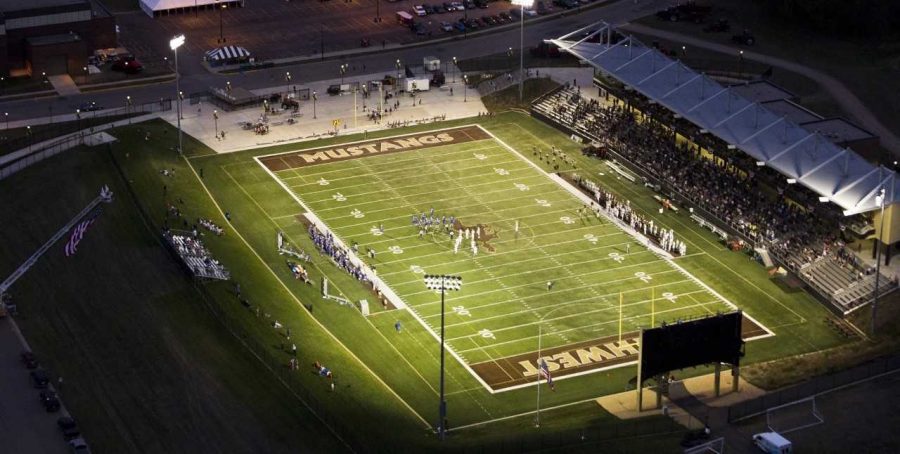To kneel or not to kneel: Mustangs divided
When the national anthem plays at the next SMSU football game, no Mustangs will be kneeling on the field.
It’s not because none of them want to exercise their right to free speech and protest police violence.
In 2017, some SMSU football players joined the national protest by kneeling during the anthem. Several of those players, who asked to not be named in this article, said they would have knelt again this season.
SMSU’s head football coach Cory Sauter said that the team voted to stand during the anthem.
“We told the team that whatever we decide to do, we’ve got to make sure that we all do it together,” Sauter said. “When we go out and play a football game, we don’t have a couple guys wearing gold jerseys, a couple guys wearing grey jerseys, a couple guys wearing white jerseys. We’ve got to be unified in our approach. We don’t want to become a distraction to ourselves, our fans, or anyone else.”
Jay Lee, the director of Diversity and Inclusion at SMSU, had mixed feelings about this approach.
“I don’t think [team members] should respond out of feeling pressured so everybody else will feel comfortable,” Lee said. “The problem we have in our society is that people in an underrepresented group are often pressured and encouraged to acculturate into the norm of that environment, which doesn’t allow you to be an individual.
“As a person of color, as a woman, you live that discrimination every day,” Lee said. “A white male or a black male might say ‘Let’s forget about women’s issues, and let’s just move on and it will correct itself.”
Another member of the SMSU football team also disagreed with the idea of ignoring the issues, saying that if it’s not directly addressed, it will only build resentment.
“If you’re going to address one issue and take a stance to say everyone needs to stand you definitely need to have that discussion and make sure that those players also feel they’re being heard on those issues that they’re facing,” Cassie Williams, an academic specialist and counselor in the Access, Opportunity, & Success office, said.
SMSU advertises itself as a diverse and welcoming community. The university’s mission statement states: “Southwest Minnesota State University prepares students to meet the complex challenges of this century as engaged citizens in their local and global communities.” Among the university’s core values are “civic and community engagement, diversity and global awareness.”
Diversity and global awareness, core values listed in the mission statement, include, “SMSU faculty and staff . . . foster cultural understanding and interactions . . . provide a supportive environment for intellectual expression and civil communication by all groups.”
President Connie Gores became SMSU’s ninth president in 2013. In her five years at SMSU, a diversity plan was drafted and implemented with the goal of creating a diverse and welcoming community.
“It’s important to me that every single voice on campus is heard, especially the student voices,” Gores said. “It’s critical that we have an environment that is open and affirming, supportive and welcoming to all individuals, and that we have an environment that is diverse and inclusive of all viewpoints and all backgrounds and individuals.”
President Gores hired the campus diversity officer as part of SMSU’s diversity plan and oversaw the creation of a 2016-2021 strategic plan to ensure that the universities core values are upheld.
“It’s important to address as a campus community in various areas, the issues that are taking place,” Williams said. “Because some of the same students when they leave campus, or even on campus, they are experiencing those issues of racism or discrimination. Those need to be addressed and how do they deal them and really be a listening ear.”
But some members of the Black Student Union and the African Student Association said that they do not feel that the university always listens to their concerns. Students were not made aware of the policy for athletes to stand for the anthem. The decision came as the result of a team vote.
One member of the Black Student Association said that with black athletes being the minority, voting on this policy was an unfair way to handle this issue.
The policy was recently brought up at a meeting of the SMSU Student Senate which resulted in considerable discussion. The issue was tabled at the end of the meeting with the intent that the Students Union would investigate further.
“I believe students should be allowed to express their stance on social issues, especially when it directly affects them,” Doria Drost, the student government public relations officer, said. “These are issues on our campus and our students should have a voice.”
William’s experiences in the AOS office led her to the same conclusion.
“You really have to understand the why of it,” Williams said. “It has been really misconstrued on what the real issue is. It’s an issue that I feel, as Americans, we should all be concerned about.”
“It’s about police brutality, it’s not about the national anthem and that’s what people need to understand,” Lee said.
“If we are requiring teams to not kneel, you’d have to really look into and address the issues that are there for not kneeling,” Williams said. “You need to have that discussion and talk about some of the issues of racism and discrimination and disproportionate treatment of people of color.”

